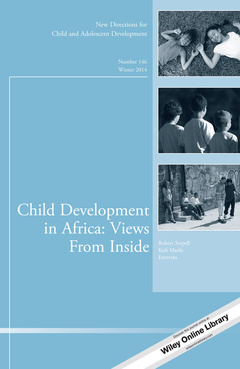Description
Child Development in Africa: Views From Inside
New Directions for Child and Adolescent Development, Number 146
J–B CAD Single Issue Child & Adolescent Development Series
Coordinators: Serpell Robert, Marfo Kofi
Language: English
Subject for Child Development in Africa: Views From Inside:
128 p. · 15.3x22.8 cm · Paperback
Description
/li>Contents
/li>
In this volume, African scholars engaged in research on the continent reflect on their recent and ongoing empirical studies. They discuss the strengths and limitations of research methods, theories, and interventions designed outside Africa to spur innovative research on the continent. And they explore how insights from African philosophical, theoretical, and empirical work can be combined with exogenous forms of knowledge to generate understanding of the processes of African children’s development in ways that are responsive to local contexts and meaningful for indigenous stakeholders.
A new field of African child development research is emerging in African societies, focusing on children as valued and vulnerable members of society and potential civic leaders of the future. Systematic inquiries are now designed to enhance our understanding of how African children think, to discover effective ways of communicating with them, and to inform successful strategies of promoting their health, education, and preparation for adult responsibilities in society.
This is the 146th volume in this Jossey–Bass series New Directions for Child and Adolescent Development. Its mission is to provide scientific and scholarly presentations on cutting edge issues and concepts in this subject area. Each volume focuses on a specific new direction or research topic and is edited by experts from that field.
Robert Serpell, Kofi Marfo
The authors contend that early debates about the generalizability of Western theories of child development should give way to a focus on responding to developmental phenomena distinctive to the African region.
2. Biomedical Risk, Psychosocial Influences, and Developmental Outcomes: Lessons From the Pediatric HIV Population in Africa 23
Amina Abubakar
The author reviews evidence that the impact of HIV and AIDS on child development in Africa involves interaction between biological and psychosocial factors, and outlines strategies of quantitative analysis to determine causal pathways as a guide to pediatric intervention.
3. African Early Childhood Development Curriculum and Pedagogy for Turkana Nomadic Pastoralist Communities of Kenya 43
John T. Ng asike
The author critiques the current early childhood educational provision for a pastoralist community in Kenya and proposes a framework for integrating indigenous knowledge and ecoculturally prevalent learning contexts into ECE instructional programs.
4. Promoting Children s Sustainable Access to Early Schooling in Africa: Reflections on the Roles of Parents in Their Children s Early Childhood Care and Education 61
Jacob Marriote Ngwaru
The author reviews his research in rural Zimbabwe, Kenya, Uganda, and Tanzania showing that support for children s transition from home to school suffers from weak parental participation and lack of appropriate learning materials, and advocates for more culturally responsive early childhood education.
5. Design and Validation of Assessment Tests for Young Children in Zambia 77
Beatrice Matafwali, Robert Serpell
The authors explain the need for culturally appropriate child assessment instruments and describe two programs of test development in Zambia.
6. Some Growth Points in African Child Development Research 97
Robert Serpell, Kofi Marfo
The editors present concluding observations and perspectives on how the invited authors respond to key challenges identified by the editors and, in so doing, help advance an African field of child development.
INDEX 113




